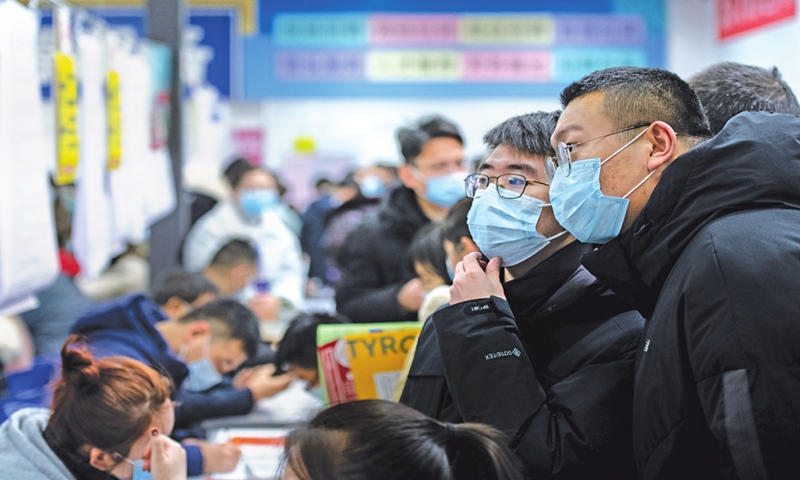College graduates face shrinking jobs as ministry estimates 10.76 million will hit market in 2022
Education ministry estimates 10.76 million will hit market in 2022

Two college graduates read a job description at a recruitment fair held in Taiyuan, North China's Shanxi Province on February 8, 2022. Photo:cnsphoto
"I am paying close attention to the employment situation in 2022, as I am graduating next year," a third-year university student based in East China's Jiangxi Province surnamed Niu expressed his concern regarding the current job market, in an interview with the Global Times on Wednesday.
Niu's concerns came as the number of graduates in 2022 is expected to hit a record high of 10.76 million, exceeding 10 million for the first time and 1.67 million more than 2021, according to the Ministry of Education.
Although the domestic job market is facing increasing pressure due to the ongoing COVID-19 epidemic, authorities in China have been implementing supportive policies in attempt to ease the situation.
A total of 2.85 million new jobs were created in the first quarter of 2022, completing 26 percent of the annual target, Chen Yongjia, an official from the Ministry of Human Resources and Social Security said at a press briefing on Wednesday, emphasizing that the overall recruitment situation remains stable.
Chen noted that the ministry will continue to prioritize and promote the employment of college graduates while working jointly with relevant departments to meet their job seeking needs with strengthened support.
Industry reports and experts said that college graduates in the first quarter are facing growing employment challenge amid the country's battle against the latest Omicron outbreak, and a slowdown in economy.
Mounting pressure
China's urban surveyed unemployment rate averaged 5.5 percent in the first quarter, 0.1 percentage point higher than the same period of 2021, the National Bureau of Statistics said earlier this month.
Job seekers in the first three months of the year faced a markedly more competitive labor market especially with a surge in demand combined with a reduction on the supply side, according to a report jointly conducted by zhaopin.com, one of China's largest online recruitment platforms, and the China Institute for Employment Research (CIER) at Renmin University of China.
Decreased job opportunities were largely the result of localized COVID-19 outbreaks while some enterprises underwent structural transformation, according to the report, adding that the return of more Chinese students from abroad has aggravated competition.
Industry-wise, job vacancies are dropping for some previous popular choices following tightened regulation on off-campus tutoring and recent layoffs by a few internet giants, according to zhaopin.com.
The demand for jobs in the Beijing-Tianjin-Hebei region has remained stable on a quarterly basis, while demand in the Yangtze River Delta and Pearl River Delta regions fell by 5 percent and 13 percent respectively, affected by local COVID-19 outbreaks. The number of job seekers in the Beijing-Tianjin-Hebei region, and the Yangtze River Delta and Pearl River Delta regions however rose by 18 percent, 35percent and 37 percent, respectively.
Moving forward, how the labor market would evolve in the coming months is uncertain and will in large part depend on domestic epidemic control and the global situation, Zeng Xiangquan, director of CIER said on Tuesday.
Strengthened support
The State Council, China’s cabinet, vowed at a meeting on Wednesday to step up efforts and implement relevant policies to stabilize the domestic employment situation, CCTV reported.
For instance, the meeting stressed the importance of increasing job opportunities and implementing policies and measures to support innovation and entrepreneurship, while continuously promoting the key program jointly implemented by 10 national authorities aiming to offer more than 1 million internship opportunities to college students in 2022.
The meeting also called for services and backup work for college graduates to be ensured, including measures such as improving the online contract signing system.
At the press conference on Wednesday, Chen stressed that the ministry will implement a range of measures targeting four aspects including expanding recruitment channels, enhancing the promotion of available occupations to graduates, while strengthening support to provide more internship opportunities and assisting students who need additional help.
The Ministry of Human Resources and Social Security has already started a campaign to offer employment guidance to graduates on campuses across the country, while implementing online events for students affected by the ongoing COVID-19 outbreak. Since March, more than 10,000 events connected to the campaign have been organized, providing information for nearly five million jobs and reaching almost six million graduates.
Meanwhile, analysts noted that jobs demand for some emerging industries such as biomedicine and smart manufacturing have been growing thanks to the country's continuous support.
The long-term development for industries like biomedicine and smart manufacturing will be bright as the central government vowed to support the real economy, and high-tech manufacturing, Mao Yufei, a research fellow at CIER told the Global Times.
Although it would be difficult to make up the current demand gap by solely relying on technology-driven manufacturing industries, the development potential for these industries over the long run will be positive, Li Qiang, executive vice-president of zhaopin.com told the Global Times.
While responsible authorities have been enhancing efforts to support the labor market, domestic recruitment platforms have also been working nonstop in a bid to promote the high-quality employment suited for college graduates.
For instance, Li noted that zhaopin.com has organized multiple online and offline events while offering different services to connect graduates directly with enterprises amid the outbreak in order to alleviate the immediate need for employment.
Experts also stressed the importance of exploring the possibility of setting up a data monitoring system to track national recruitment data.

